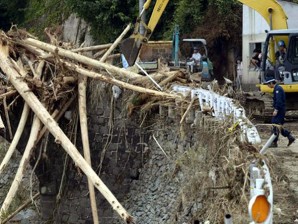
A loading shovel removes dirt and trees covered on a road after heavy rain in Yame, southwest Japan, on Monday, July 16, 2012. A typhoon skimmed past sodden southwestern Japan on Wednesday dumping rain on an area already struggling to clean up after huge floods. AP PHOTO/KYODO NEWS
UKIHA, Japan—A typhoon skimmed past sodden southwestern Japan on Wednesday dumping rain on an area already struggling to clean up after huge floods.
By late afternoon Typhoon Khanun was sitting west of the main southern island of Kyushu, packing winds of up to 120 kilometers (75 miles) per hour, the Japan Meteorological Agency said.
The storm was moving away from Japan, heading toward South Korea, but was still causing rain in Kyushu where floods and landslides have left 32 dead or missing over the last week.
“In some places recent heavy rainfall has left the ground very loose, so we are warning local residents to be vigilant against mudslides,” the weather agency said.
More than 90 centimeters of water has fallen in the area around Mount Aso, an active volcano, so far this month, the agency said, far outstripping what would normally be expected.
Around 15 people in the small city of Ukiha were cut off when roads were damaged and bridges washed away after rivers burst their banks.
“I have never experienced such floods in my life,” 57-year-old farmer Shigeru Kawauchi told AFP.
“It is the first time I have seen the river flowing so violently that it was sweeping houses away,” he said.
Meanwhile, the main Japanese island of Honshu was wilting under soaring temperatures with authorities issuing hot weather alerts in central parts of the country.
Nearly 2,500 people were taken to hospital in the week to July 15 alone, 2.5 times more than a week earlier, the disaster management agency said Wednesday.
Twelve students at a Tokyo primary school were taken to hospital on Wednesday after they complained of headaches and difficulties in breathing during outside exercise, local media said.
A 55-year-old man died in Toyama prefecture apparently from heat stroke on Tuesday, while 688 people were taken to hospital due to heat exhaustion, public broadcaster NHK said.
One person died and nearly 700 others were taken to hospital suffering from the effects of heat on Monday.
Japan is asking people to limit the use of electricity-sapping air conditioners as the country battles a possible power shortfall, with the vast bulk of nuclear generators offline in the aftermath of the Fukushima disaster.